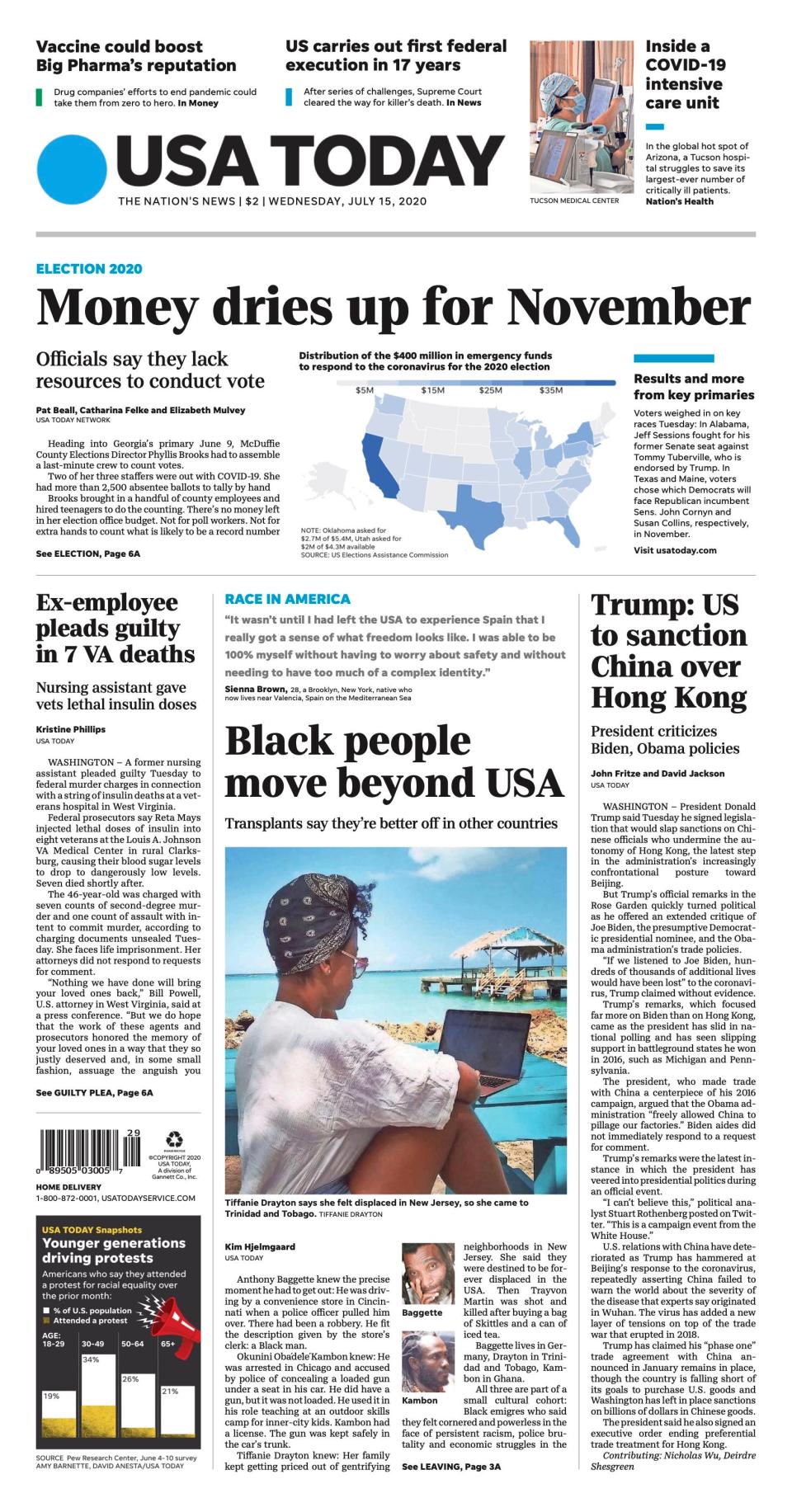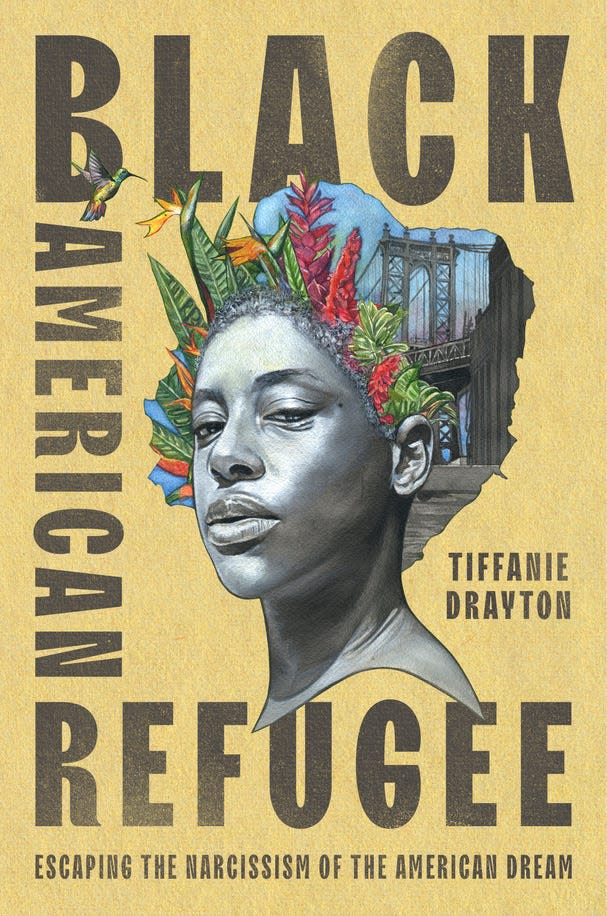Tiffanie Drayton is a 'Black American Refugee.' Why she left the U.S. to pursue dreams elsewhere
When Tiffanie Drayton left the U.S. for Trinidad and Tobago in 2013, she became part of a small cultural cohort: Black American emigres who said they felt cornered and powerless in the face of persistent racism, police brutality and economic struggles in the U.S. and chose to settle and pursue their American-born dreams abroad instead.
No official statistics cover these international transplants. But they span the globe, and leave the U.S. temporarily or permanently for different reasons: in search of a better quality of life, for work opportunities, to marry or retire, for tax reasons, for adventure.
Drayton, 32, left in part because her family kept getting priced out of gentrifying neighborhoods in New Jersey. Then 17-year-old Trayvon Martin was shot and killed after buying a bag of Skittles and a can of iced tea – a tragic moment that for Drayton reinforced the lifelong challenges she faced as a Black American.
"In America, your hands are shaking. You're worried about what to say. You're worried about whether you have the right ID. You're just so worried all the time," Drayton told USA TODAY in June 2020, describing the interactions she and her family and friends regularly experienced with American police officers.

'I'm leaving, not coming back': Fed up with racism, Black Americans head overseas
This month Drayton publishes "Black American Refugee: Escaping the Narcissism of the American Dream" (Viking, 304 pp., out now), a look at race in America told through the lens of her personal journey. Drayton's tale is told with verve and honesty. It blends her experiences trying to ascend America's traditional citadels of success – whether it's relationships or pocketbooks – with historically contextualized explanations about the many barriers put in front of Black Americans.
What follows is a lightly edited version of a Q&A email correspondence with the author:
Question: Why did you have to write this book? Why was it necessary to you?
Tiffanie Drayton: I first began to unravel the complexities of systemic racism in college after taking a class called "Racial Stratification in the U.S. Economy" with a professor named Darrick Hamilton. In doing so, I was finally able to enumerate the number of ways racism had negatively impacted my life and come to terms with it. The experience was both relieving and empowering! This book was my opportunity to humanize the conversation about systemic racism, while also giving others the necessary information to understand it.

Q: You write in the book that Black emancipation "has always been about more than just being physically free." What's your idea of freedom?
Drayton: Freedom is the opportunity to be in an environment that recognizes, cherishes and protects your humanity and culture. Where people within it think of you as an extension of themselves – like family even. For me, that looks like walking through neighborhoods or driving at night without fearing me or my family will be treated badly just because our skin is a browner hue. It also looks like parading through the streets of Trinidad and Tobago for Carnival while surrounded by people of all colors who are all there to experience one thing: joy.
Q: You had a place to escape. Most Black Americans don't. What's your advice to them?
Drayton: Black Americans have one of the most powerful passports in the world. Just as people immigrate to (the U.S.), Black people can immigrate elsewhere.
Q: The word only appears once in the book, but in our conversations, you mentioned that "Black American Refugee" is, among other things, a call for "reparations." What is your vision for what a reparations policy would look like?
Drayton: America, and the rest of the world’s colonial powers, owe reconciliatory justice to those whose lineages and lives have been ravished or destroyed by structural racism and oppression. To me, that means acknowledgment for wrongdoing written into law and history and compensation in the form of both financial restitution and the redistribution of the world’s wealth and resources.
Reparations bill gets new attention: Could other nations provide a blueprint?
Q: You take aim in the book at liberalism and the liberal left in America, saying that it has "allowed whites to maintain a sense of self-righteousness, to claim moral high ground and standing," essentially through inaction on racism. How can whites help dismantle the systemic, structural racism your book addresses?
Drayton: Whites are wholly responsible for dismantling systemic racism and must embrace that obligation and responsibility. Whiteness has been so normalized that we accept the government is almost entirely run by white men but could never conceive of it almost entirely run by Black or indigenous women. We must decentralize whiteness and normalize humanness in its various forms.

Q: You document a lot of the bad about America. What about the good?
Drayton: My book offers a nuanced and critical perspective of America through the lens of a Black woman. One full of beauty, hardship and the fight to reclaim my dignity.
Q: Without giving away the ending of the book, I think we can say the story ends in Trinidad. But of course, there are forces constantly pulling you away from there. What can you say about what you are up to now and plan to do next?
Drayton: I believe my access to America is essential for me to inspire the change I want to see ripple out through the world. I may return to America at any time but with one purpose in mind and heart: to light the flame that hopefully sets fire to the systems erected to oppress and destroy this planet and the beautiful people of every shade within it.
More: Taye Diggs says his 12-year-old son with Idina Menzel inspired his new book on racial injustice
Kim Hjelmgaard is an international correspondent for USA TODAY.
This article originally appeared on USA TODAY: 'Black American Refugee': Tiffanie Drayton explains why she left U.S.

